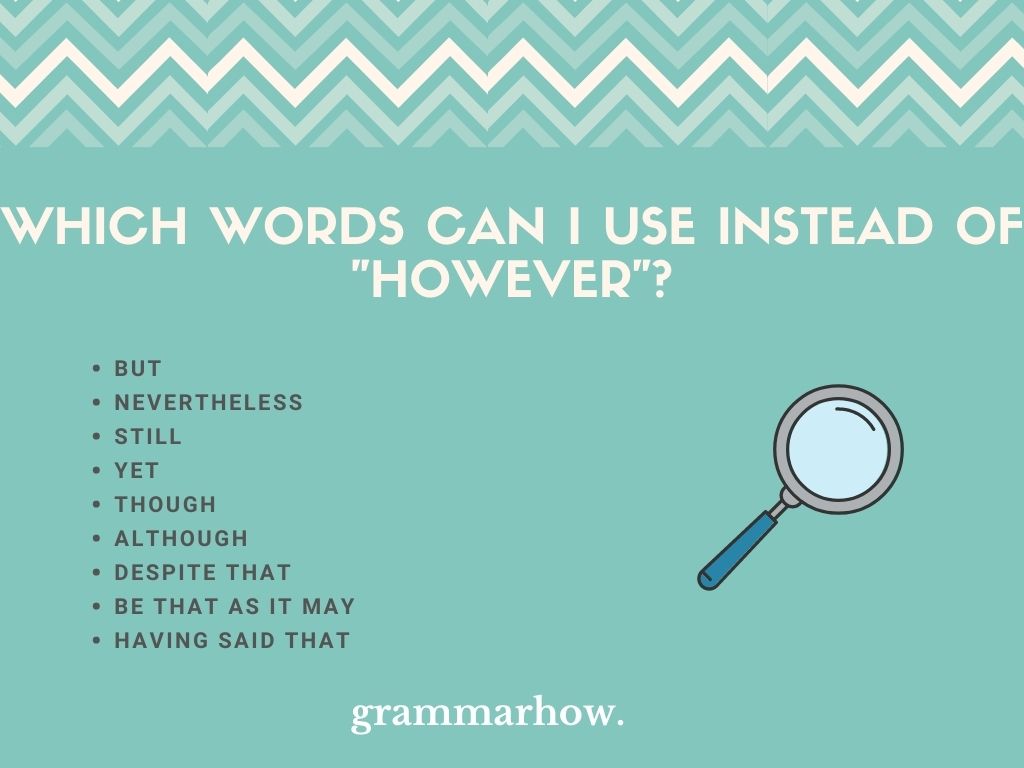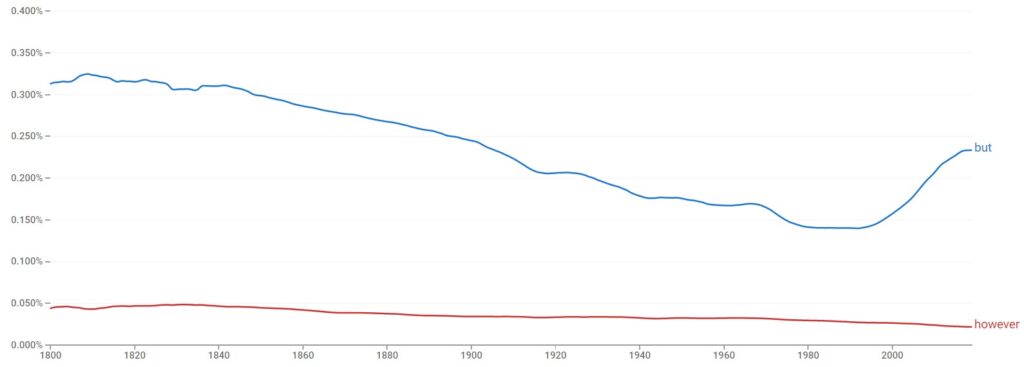“However” is undoubtedly a great word to use to counter a previous point you’ve made in writing. It can be somewhat overdone, which is why we think it’s time to look at some synonyms for it. This article will explore all the best alternatives for “however.”
Which Words Can I Use Instead Of “However”?
There are plenty of options to replace “however,” each one offering a different way for you to introduce a counterpoint or idea. This article will look at the following:
- But
- Nevertheless
- Still
- Yet
- Though
- Although
- Despite that
- Be that as it may
- Having said that
The preferred version is “but” because it’s the most common one seen in English. Most people know what it means, and it’s easy to read on a page (since it only features three letters).
But
Another way to say however is by using “but,” and it’s perhaps the most popular choice to do so.
“But” works well when we want to introduce a counterargument while keeping the text light and easy to comprehend. It’s the quickest way to use “however” and doesn’t need to be used in more formal contexts.
Generally, “however” is a formal word. We mostly use it in articles or writing designed to capture the formal audience’s attention. “But” isn’t as strict with its usage, and you can find it equally in informal and formal writing styles.
You might see “but” in some of the following ways:
- I liked that idea, but I don’t think it’s wise to continue talking about it.
- They tried hard to find the gold, but it was to no avail.
- This mission was a resounding success, but there is still more to find out there.
Nevertheless
Next, we come to “nevertheless,” which is a slightly less common phrase that works in formal situations.
“Nevertheless” and “nonetheless” are interchangeable and mean the same thing. You can use either to introduce a counterargument from the previous point.
Just like most of the words on this list, “nevertheless” is an independent clause that we use to include more information on the previous point, which means we need to include correct punctuation.
The correct punctuation choices include a semi-colon or a period before “nevertheless” and a comma after it.
- They worked hard for what they achieved; nevertheless, people looked down on them.
- You shouldn’t have said that to me; nevertheless, I will have to act on it accordingly.
- There are plenty of things wrong with this project; nevertheless, he will work on it.
Still
“Still” is one of the best choices to replace “but,” and many native speakers use the two interchangeably throughout their writing to keep things unique and creative.
“Still” works well to introduce a counterpoint and comes with the same punctuation needs as “however.” It means the same as “but” but is used as an independent clause to introduce a new idea to an argument or qualify a previous one.
“Still” is one of the easiest words on this list to use, and it doesn’t always have to introduce a counter idea. Instead, it can reaffirm the previous statement, though it’s rare to see it used in this way.
- No one could beat them. Still, she thought her team stood a good chance.
- You should keep quiet while I work. Still, I don’t reckon you’ll be too fond about doing that.
- There is much to do today; still, I don’t see a way to get it all done.
Yet
“Yet” and “but” are synonymous. They use the same language rules, which helps many writers use them. “Yet” is definitely a better choice to replace “but” than “still” is, which a lot of people overlook.
“Yet” only needs a comma to work in a sentence, just like “but.” We can use it whenever we’re introducing a point that doesn’t agree with the previous one stated.
People often find “yet” easy to use because it’s quick to say and only consists of three letters (much like “but”).
- I don’t see you helping, yet I hear you complaining an awful lot.
- We must work together on this, yet you insist on ignoring our commands.
- The government works in mysterious ways, yet they always make their mistakes popular in the media.
Though
“Though” is another common choice which we often see instead of “however.” Many people think it works in the same way as “although.” It’s simply a shorter version of “although” in the case of countering an argument.
“Though” is a great choice, like “yet” and “but,” which only requires a comma to work.
You will find “though” written quite a lot in English when introducing a counterpoint, and here are some examples of how it might look:
- I can see where you’re coming from, though I don’t much like your idea.
- There was a lot of money in the project, though they weren’t keen on telling us that.
- We found what we were looking for, though we weren’t best pleased with the result.
Although
“Although” is identical to “though.” We use both words for the same reason, and it seems that “though” has evolved over time to replace “although.”
“Although” is a great synonym, though it’s clear that “though” is becoming the more popular choice of the two. Both follow the same language rules, making them easier to use than “however.”
“Although” is an old-fashioned word, and many native speakers think the “al-” prefix is redundant and unnecessary. For that reason, “though” is more common today.
- I’d like to take you to dinner, although I don’t think you’ll agree to that.
- There have been many reports of injuries in this area, although the police haven’t confirmed anything suspicious.
- The news is full of lies, although no one is sure how or why they get there.
Despite That
“Despite that” is the first alternative way of saying “however” that uses more than one word in this list. We like it because it works well in more formal situations.
“Despite that” is a formal phrase. We use it to talk about a counterargument from the previous point raised, and many essays are elevated in quality when using a phrase like “despite that.”
While many of the one-word options above are great for both formal and informal cases, “despite that” is mostly only for formalities. That makes it the ideal candidate for essay writing, research papers, and work emails.
- The findings have proved many things wrong about this study; despite that, I’m still willing to progress with my initial hypothesis.
- You could find faults wherever you look. Despite that, the world is still beautiful in its own way.
- I have found many discrepancies in the profit register. Despite that, I believe this work is dutiful and moral.
Be That As It May
“Be that as it may” is another phrase rather than a one-word choice. We use it in the same way as “despite that,” and it means that while the previous point means one thing, we’d like to raise another idea.
“Be that as it may” is another formal option that you’ll only find in those situations. It will rarely be used in a casual environment.
- We have yet to see results. Be that as it may, we will keep working towards them.
- You don’t know what you’re doing here. Be that as it may, you’ve got a right to see what we’re doing.
- Be that as it may, I don’t think you can talk to me in such a manner.
Having Said That
“Having said that” is synonymous with “be that as it may,” to mean that, while we’re saying one thing, we’re about to raise a point that highlights the opposite.
Again, “having said that” is a formal choice, though it’s not quite as formal as some of the others.
- You shouldn’t be here. Having said that, I think you can help me.
- There are many more places to explore in this world. Having said that, studies show it’s unlikely that we’ll ever explore them.
- The solar system is a vast expanse of nothing. Having said that, I’m excited to see where space travel might take us.
What Does “However” Mean?
“However” means despite the previous statement. We use it when we want to talk about a contradicting idea to the one we just raised, even if that seems counterintuitive to the goal of our writing.
The definition of “however,” according to The Cambridge Dictionary, is “despite whatever amount of degree.”
Can You Say “But However”?
“But however” is never grammatically correct. It’s known as reduplication, where we use two words that have the same meaning. Ultimately “but however” means “but but” or “however however.” Both of those statements are grammatically incorrect.
Which Is Better: But Or However”?
According to this graph, “but” is more popular than “however,” making it the more recognized and thus better choice than “however.”
Many people prefer using “but” because it’s much easier to find a place to write it in your writing. Also, because it comes with less strict punctuation rules, it’s easier for people still trying to learn the language to use it effectively.
You might also like: How To Use However In The Middle Of A Sentence (9 Examples)
Martin holds a Master’s degree in Finance and International Business. He has six years of experience in professional communication with clients, executives, and colleagues. Furthermore, he has teaching experience from Aarhus University. Martin has been featured as an expert in communication and teaching on Forbes and Shopify. Read more about Martin here.
By Dr Oliver Tearle (Loughborough University)
There are lots of strange ideas surrounding the word ‘however’. Some teachers tell their students they shouldn’t begin a new sentence with the word ‘but’, and should substitute the word ‘however’ instead.
However (as it were), this misses the fact that ‘but’ and ‘however’ are different classes of words, with ‘but’ being a conjunction and ‘however’ being an adverb.
Curiously, the Oxford English Dictionary (OED) names Shakespeare as the first citation of ‘however’ as a synonym for ‘but’ or ‘notwithstanding’: Shakespeare’s late history play Henry VIII, co-authored with John Fletcher, contains the lines: ‘All the Land knowes that: / How euer, yet there is no great breach.’ As the tautological ‘How euer, yet’ shows, ‘However’ is being used to mean ‘yet’ or ‘nevertheless’ here.
In any case, there’s nothing wrong with using ‘but’ at the start of a sentence – and much can go wrong if you misuse ‘however’, treating it as a simple synonym for ‘but’. Let’s take a closer look at some of the alternatives to the word ‘however’ and how they can be used in speech and writing.
Synonyms for ‘however’
Let’s start with BUT. This short, simple word is a conjunction, because it is used to join clauses together, much like ‘and’. Consider these two statements, involving going to look for the cat:
A: I looked in the garden and the cat was there.
B: I looked in the garden but the cat wasn’t there.
In both cases, the (italicised) conjunction) joins the two clauses together, but in B, of course, the cat isn’t there so the conjunction but is used. But we could also have used however here:
I looked in the garden; however, the cat wasn’t there.
However is an adverb rather than a conjunction, hence the comma that follows it. Adverbs are often words ending in -ly, such as happily or sadly or quickly, and one can imagine a slightly different sentence that might read:
I looked in the garden; happily, the cat was there.
So but is a simpler and more direct way of saying virtually the same thing as however in such examples.
Another short word, YET, serves a similar function, and can therefore serve as a synonym for however, as in ‘I looked in the garden, yet the cat wasn’t there’.
The word STILL works slightly differently from but and yet and is, in some ways, closer to however than either of those. Indeed, in syntax it is often literally closer to however, since the two are used together, as in this example from the historian Thomas Babington Macaulay in 1825: ‘Still, however, there was another extreme which, though far less dangerous, was also to be avoided.’
In such an example, ‘still’ means something similar to NONETHELESS (or NEVERTHELESS: they are both synonyms for each other): that is, DESPITE THAT, THAT BEING SAID, ALL THE SAME, or JUST THE SAME.
For instance, ‘I know it’s useless buying a lottery ticket; still, someone’s got to win, haven’t they?’ A synonym for still in this sense (and for nonetheless/nevertheless) is NOTWITHSTANDING.
AFTER ALL also performs this function, as in Edmund Spenser’s The Faerie Queene (1590): ‘Yet after all, he victour did suruiue’ means essentially, ‘however, he survived as victor’.
Indeed, a suite of words which also convey this idea of just the same or notwithstanding are REGARDLESS, ANYHOW, ANYWAY, and EVEN SO. Remember to steer clear of ‘irregardless’, a word frowned upon because it makes no sense (the ir- prefix presumably negates the word regardless, so its meaning would be the opposite of ‘regardless’).
THOUGH and ALTHOUGH are two more words which can be used more or less interchangeably with however. For instance, ‘He’s a good singer; however, he’s no Frank Sinatra’ could be rewritten quite easily to read, ‘He’s a good singer, (al)though he’s no Frank Sinatra’.
Using though (or although) arguably softens the blow of the criticism of the person’s singing in the second half of the sentence, in a way that however does not: however acts as performative throat-clearing before delivering the stinging indictment of the singer’s abilities, whereas though and although keep the emphasis slightly focused towards the start of the sentence, and the good news (‘He’s a good singer …’).
A slightly more archaic synonym for however is HOWBEIT. Whereas albeit has lasted, howbeit, which means roughly BE THAT AS IT MAY, has become largely obsolete and so is best avoided as an archaism or old-fashioned word. Of course, if you’re writing historical fiction, it may be just the term you’re looking for!
Antonyms for ‘however’
If however sees the clause which follows it swerving away from the clause which precedes it (as in the example ‘I looked in the garden; however, the cat wasn’t there’), then good antonyms for however see the two clauses agreeing with each other: the latter one follows naturally and smoothly from the former.
With this in mind, we might identify THEREFORE, THUS, and SO as antonyms for however.
Getting your writing perfect can be challenging. However, we’re here to help. Nevertheless, there are words that come up that can be confusing. See what we did there?
However and nevertheless are interchangeable, but sometimes one word is more appropriate to use than the other. Today, we’ll be clearing up when to use however and when to use nevertheless.
However
Most of us use the word however without giving it much thought. In 2022, it’s a much more commonly used word than nevertheless.
However is a transition word that shows a contrast between two statements or ideas. It can be used in the middle of a sentence:
I liked the film; however, it wasn’t as funny as it seemed in the trailer.
Nevertheless
Nevertheless is much less common than however. But, like however, nevertheless is also a transition word that is used to present opposing ideas or statements.
He didn’t perform as well as usual. Nevertheless, the audience loved him.
Find this useful?
Subscribe to our newsletter and get writing tips from our editors straight to your inbox.
So, what’s the difference?
However and nevertheless are interchangeable words. However, you might want to consider the following to inform your choice:
First, nevertheless is more formal than however. It’s not often used in spoken English (although it’s completely fine to use it in spoken English if you want to) and lends itself more to academic or business writing.
Nevertheless is better used as a concessional statement. But however is commonly used as both a concessional statement and to present opposing ideas. It’s more emphatic than however.
If you’re struggling, think of it like this: nevertheless is more like in spite of, and however is more like but.
Ready to take your writing to the next level? We offer a proofreading and editing service for professionals, students, authors, and more.
With us, you’ll have a handpicked team of expert editors who’ll proofread and edit your work, eliminating spelling and grammar mistakes, inconsistencies with tone, accuracy problems, and formatting issues.
Click here to get 500 words of your writing proofread by us completely free of charge.
However is a commonly used transition word in English, and it has a lot of value for learners who are looking to diversify their vocabulary. In this article, we will provide you with synonyms for however.
What does the word however indicate?
However is an adverb that can be used to introduce a statement that contrasts with or seems to contradict something that has been said previously, most formally as in the sentence, “We can fear everything about Covid-19. However, fear cannot help us get rid of it.”
The word can also be used as a relative adverb as in “However they try to cut them down, expenses keep mounting.” However can also mean whatever way; regardless of how indicating the enormity or urgency of a task like in “Do the best you can however it takes.”
What word can replace however?
There are a lot of synonyms to however (that can be used to replace the word), and in the sections below you will find examples. What is another word for however? Look for words that most suit the context of your search using a thesaurus.
In the context of in spite of
However is often used among transition words transition that is related to in spite of. However synonyms have a lot of beneficial applications when it comes to the variety of your vocabulary in English. Here is a list of examples of other words for however in the context of in spite of:
- Despite – John was late for school, despite leaving ten minutes early.
- Nonetheless – The family was excited about going on holiday. Nonetheless, this was also a stressful time.
- On the flip side – A thesaurus is always useful. On the flip side, articles like this one can be easier to find.
- But then again – It might be hard to find the right word at all times. But then again, English is a rich language with a lot of potentials.
If you are in search of synonym for however, or just looking to add a different word to your vocabulary you can always use a thesaurus. In the context of in spite of, however has multiple related words. This is an important word of the day to day language, and it may be helpful to have some related terms in your vocabulary.
In the context of how
If you are looking for a synonym of however in the context of how, you can check out a list with the proximate meaning even in a thesaurus. Here are two common words used as another way to say however:
- In what manner – My boss needs to have this work finished. According to him, it does not matter in what manner this will happen.
- In what way – In what way you use the words in the thesaurus is completely up to you.
Is however a formal word?
However is currently perceived as a rather formal word, as it is predominantly used in academic writing. Still, related terms can be used informally, despite the word’s connotation.
Synonyms and any word that can be used as a replacement for however can be used both in formal and informal settings. However, another word might be more informal, in spite of the similarity between related terms.
🔺Although — вопреки тому, что; несмотря на то, что.
Это слово мы используем, когда хотим противопоставить информацию в одном предложении. Вопреки какому-либо действию, происходит что-то.
Кстати, although настолько крутой и уверенный в себе, что может стоять в любом месте предложения и не требует запятых 😎
ОЧЕНЬ важная штука: если ты употребляешь в своем предложении although, это должно быть сложное предложение (то есть внутри должно быть два полноценных предложения). For instance:
▪️ Hey, you better not touch her! Although she spent the whole day shooting videos for TikTok, none of them were included in the recommendations.
Эй, чувак, её лучше сейчас не трогать. Не смотря на то, что она потратила целый день на съёмку видео в Тик-Ток, ни одно из них не залетело в реки 🥵
В простом предложении можно юзать только (!!) however и nevertheless.
🔺Nevertheless — несмотря на, однако, всё-таки
Это слово используем, когда хотим противопоставить информацию и добавить к ней новую.
For example:
He had only been studying for the exam for two weeks, nevertheless, he passed it with a high score. It was a piece of cake for him.
Он готовился к экзамену всего две недели, и несмотря на это сдал на высокий балл. Для него это было проще простого🤩 (Расходимся, схема нерабочая!)
🔺However — однако
However употребляется между двумя частями сложного предложения, но, в отличие от своего брата-близнеца «but», ещё имеет привилегию стоять в начале предложения. ☝️ Кстати, он настолько правильный, что всегда выделяется запятой, запомни!
Это слово юзаем, когда мы вводим какую-нибудь новую инфу, которая противоречит смыслу предыдущей.
Разберём на примере:
▪️ Yesterday, I was going to do lots of things. However, instead of that I decided to start watching a new series and spent the whole day in bed. Damn I dig it!
Вчера я планировала сделать кучу вещей… Однако вместо этого я решила начать новый сериал, и поэтому провела целый день в кровати. И чёрт, он мне очень зашёл (Кстати, это вполне себе real story, сериал называется «Отыграть назад», бери на заметку)
И ещё один важный поинт. However — чаще показатель негативного контраста (готовился-готовился, но не сдал😔)
Nevertheless — позитивный контраст (нифига не делал, тем не менее сдал😎)
Если вы нашли ошибку, пожалуйста, выделите фрагмент текста и нажмите Ctrl+Enter. Мы обязательно поправим!
There are many synonyms to but. For the meaning you are pointing out in your question, some of them would be still, nevertheless, nonetheless, though, although, and yet. You can find these and the ones for the other meanings in any site with synonyms lookup function, such as Thesaurus («but» synonyms).
However, it should be noted that it can be counterproductive to sprinkle your story with synonyms of a common word just for the sake of non-repetition. Just as it happens with the word «said»: Many people think you should not abuse of «said» synonyms in dialog tags (see The Use and Abuse of Dialogue Tags, for example), because it «draws [the readers’] attention away from the dialogue and yank them out of the story». Same can happen with but. The abundance of random synonyms might rather obstruct the reading experience.
If you want to show two ideas are opposed, there can be workarounds, thinking outside the box. Some times these ideas are not inherently opposed (in your first example, «Funny enough, I didn’t»); some other times, the causal relationship can be implied (in your fourth example, just removing it would keep the meaning: «As I stood there…»); and some other times, it can be necessary (the rest of your examples fall in this category, in my opinion).
To finish, a workaround example, one that I don’t pretend to be substitutive nor better, just to explain the idea:
I wanted to cry. I wanted to shout at him, tell him that I was already here. As I opened my mouth, I realized I couldn’t protest. It was my fault, after all.
Linking words to help you contrast things in English
Image source: FreeDigitalPhotos.net
But / However
But is more informal than however. You can use however at the beginning of a sentence, but you can’t use but at the beginning of a sentence (in written English).
- I tried to lift the box, but it was too heavy for me.
- I tried to lift the box. However, it was too heavy for me.
Although / Even though
These linking words are the same, and they are both followed by a subject + verb.
- Although I exercise every day, I can’t seem to lose any weight.
- She still loves him, even though he treated her very badly.
Despite / In spite of
These linking words are the same, and they are followed by a noun or a gerund (-ing form of the verb, which can function as a noun).
- Our plane arrived on time in spite of the delay during takeoff.
- We won the game despite having two fewer players.
Despite the fact that / in spite of the fact that
These phrases are followed by a subject + verb.
- Our plane arrived on time in spite of the fact that it left 30 minutes late.
- We won the game despite the fact that we had two fewer players.
While / Whereas / Unlike
These linking words are used to make contrasts. While and whereas are usually used between two complete phrases. Unlike is typically used with only a subject.
- I like tennis, while my brother prefers bowling.
- This cell phone plan costs $0.05 per minute, whereas that one gives you up to 800 minutes per month for a fixed price.
- His boss allows him to work from home, unlike mine.
- She’s very friendly, unlike her sister.
Linking Words Quiz: Contrasting Ideas
Choose the best linking word for each sentence. Good luck!
Congratulations — you have completed Linking Words Quiz: Contrasting Ideas.
You scored %%SCORE%% out of %%TOTAL%%.
Your performance has been rated as %%RATING%%
Your answers are highlighted below.
В статье вы узнаете переводы although и however, а также их отличия по правилам английской грамматики.
Одним из наиболее простых и эффектных способов разнообразить вашу речь станет, как это ни странно, умение высказывать противоположные идеи в своем изложении:
Although southern seas make it possible to enjoy swimming, I prefer the beauty of the nothern waters – Несмотря на то, что южные моря предоставляют возможность плавать, я предпочитаю красоту северной воды.
Вы не просто рассказываете о том, что любите холодные моря, но высказываете свою точку зрения по отношению к южным курортам. Это существенно обогащает ваше изложение, делает его более развернутым и интересным.
В английском языке представлено несколько конструкций, которые помогут вам воссоздать в речи эффект противопоставления.
Although и Even though
Эти две фразы очень близки по своим грамматическим требованиям, поэтому мы решили объединить их в одну категорию.
Оба выражения переводятся с английского языка как “несмотря на то, что”, “хотя”, “если бы даже”.
Для того чтобы корректно использовать эти противопоставления в английском предложении, вам нужно начать свое высказывание с этих слов. По большому счету структура будет очень походить на русскую:
Although more and more people do sky diving, I find it very dangerous – Несмотря на то, что все больше людей начинают заниматься парашютным спортом, я нахожу это очень опасным.
Even though she asked me not to call any more, I did. And I did the right thing. We made our peace with each other – Несмотря на то, что она попросила больше ей не звонить, я позвонил. И правильно сделал. Мы помирились.
Althought many people like cats and dogs, I prefer rabbits. They are silent – Хотя многим нравятся кошки и собаки, я предпочитаю кроликов. Они не шумят.
Итак, для того, чтобы построить высказывание с although или even though, вам необходимо соблюдать следующую схему:
although → подлежащее 1 + сказуемое 1 → , → подлежащее 2 + сказуемое 2
even though → подлежащее 1 + сказуемое 1 → , → подлежащее 2 + сказуемое 2
Althought many people like cats and dogs, I prefer rabbits.
Несмотря на то, что многие люди любят кошек и собак, я предпочитаю кроликов.
В группу подлежащее + сказуемое, которые чаще всего выражены существительное + глагол, могут входить и второстепенные члены предложения, но наличие главных обязательно в обоих предложениях.
Despite и In spite of
Так же как и предыдущие конструкции, эти выражения переводятся с английского языка как “несмотря на”, “вопреки”:
Despite his being tired, he behaved respectfully – Вопреки своей усталости он вел себя почтительно.
В предложении это слово является частью противопоставляющей фразы. Фраза может открывать высказывание или идти “в довесок”, подчеркивая первую идею:
He behaved respectfully, despite him being tired.
She loves you, in spite of the gossip – Она любит тебя, несмотря ни на какие слухи.
Важным моментом в такой конструкции является то, что despite и inspite of не требуют после себя группу подлежащее + сказуемое. После этих оборотов в английском языке идет только существительное или герундий, как в примере выше:
Despite / In spite of → сущ. (герундий) → , → подлежащее + сказуемое.
Despite my being late, I didn’t do anything wrong – Я не сделала ничего плохого, только вот опоздала.
However и Nevertheless
Перевод however и nevertheless – “тем не менее”, “однако”, “несмотря на это”. Эти слова могут быть началом самостоятельного предложения, которое содержит противоречие или быть частью сложного предложения.
В грамматическом плане ничего не изменится, и смысл сохранится:
I love you. Nevertheless, I must leave.
I love you; nevertheless, I must leave.
Я люблю тебя, но я должна уйти.
Moscow is a city of great opportunities; however, I prefer Irkutsk.
Москва – город больших возможностей. Тем не менее я предпочитаю Иркутск.
Слова however и nevertheless всегда выделяются запятыми.
Чтобы учить английский дальше, переходите на эту статью об отрицаниях в английской грамматике.
Оставить комментарий
Для комментирования необходимо войти через Вконтакте







